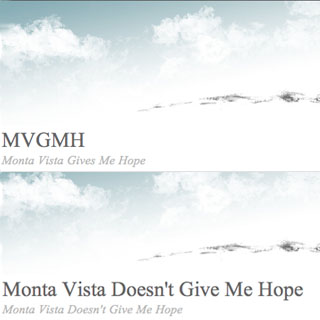Four years of academic Type A personalities, and we’ve still got our well-earned vitriol. Congrats, Matadors
The Internet has gotten cuddlier. Hasn’t anyone noticed?
It’s part of the evolution of the Information Age, as documented by good.is and New York Magazine. With Facebook’s "Likes", Tumblr’s hearts and Twitter’s stars, as well as the growing usage of IRL (in real life) identities, the Internet has become, as nymag.com’s Daily Intel put it, "a more friendly, and perhaps cloying, place".
And MVHS has found its poster child for this jarringly saccharine new phenomenon in Monta Vista Gives Me Hope.

As part of an American Literature project, juniors Nicolette Duong, Melanie Gordon, Andrew Shiah, Rosa Valtanen and Briana Zimmers created an MVHS-centric version of the famous Gives Me Hope website. Set on a simple, uplifting WordPress blog, the site allows guests to submit anecdotes about ways MVHS gives them hope. Sappy and vaguely repetitive, the site implies that virtually all students at MVHS are active, appreciative and dedicated, if overzealous, members of the community.
But the Internet is all about polite disagreement, so just after the creation of MVGMH came the advent of Monta Vista Doesn’t Give Me Hope. Though it has accumulated more hits than its upbeat counterpart, the site has been under fire for simply collecting negative criticism without offering solutions. But ardent lovers of optimism have never been the most objective.
Contrary to criticism, the site doesn’t expose a dark, angst and rage-ridden underbelly unlike some campus publications. In fact, MVDGMH’s surprisingly insightful tales of prejudice and acute incisiveness can be more empowering and enlightening than MVGMH, which tends to be relatively one-dimensional.
But it would look unfair and narrow-minded to write off either MVGMH or MVDGMH as too fluffy or too disparaging. So let’s explore. A look at each site reveals surprisingly positive intentions on both ends. MVGMH exists, as one would expect, to allow readers and users see the bright side and get empowered. MVDGMH, on the other hand, bills itself as a form of constructive criticism and a way to spread awareness of some of the issues inherent at MVHS. And while the ephemeral warm-fuzzies do bring a smile and a rare splash of compassion, problems don’t solve themselves.
With the Internet’s steady transformation into a mild-mannered network, rather than the verbal shootout it once was, even the potentially slanderous MVDGMH is a surprisingly levelheaded expression of various students and alumni’s dissatisfaction. In the long run, MVDGMH could possibly help the student population on the whole by pinpointing trending in dissatisfaction more than MVGMH’s relatively empty praise of the school.
So, yes, the Internet has gotten cuddlier. But that doesn’t mean we at MVHS are going to cuddle with it.








